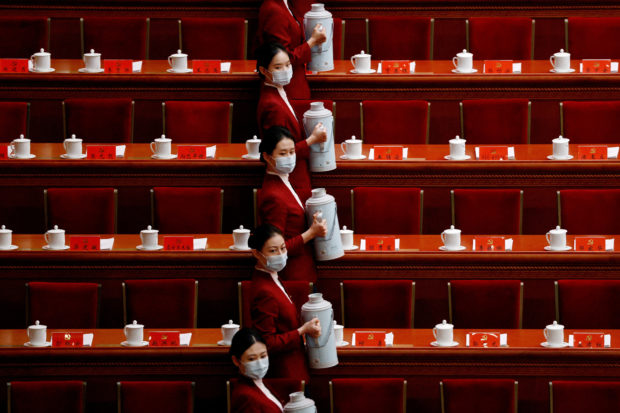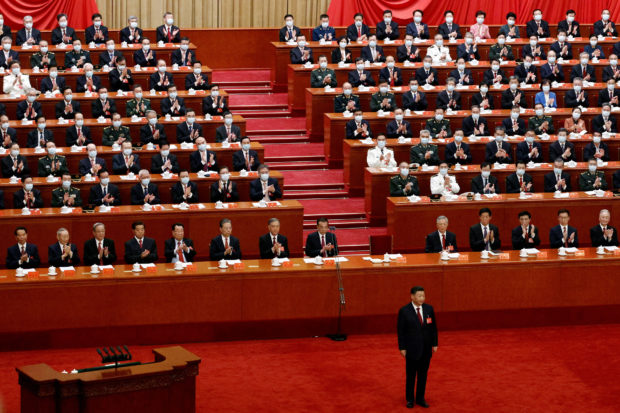For China’s women, this week’s Congress is unlikely to mean progress

Attendants serve tea for delegates before the opening ceremony of the 20th National Congress of the Communist Party of China, at the Great Hall of the People in Beijing, China October 16, 2022. REUTERS/Thomas Peter/File Photo
HONG KONG — As Xi Jinping consolidates power at China’s 20th Communist Party Congress this week, Chinese women are not holding their breath for progress in gender equality.
Xi’s decade as the party’s general secretary has seen the number of women in politics and elite government roles decline and gender gaps in the workforce widen, academics and activists say. Feminist voices have also been muzzled and in recent years, the government has increasingly emphasized the value of traditional roles for women as mothers and carers, they add.
Mao Zedong, the founding father of the People’s Republic, famously said “women hold up half the sky” and gender equality is enshrined in the country’s constitution.
But under Xi, power has become far more concentrated compared to 10-15 years ago when competing coalitions in Chinese politics sought to find favor with women that resulted in more female representation, said Cheng Li, an expert on Chinese politics at Brookings Institution.
“The trend (now) is usually women serve as a deputy or more symbolic position,” he said.
Article continues after this advertisementThe congress, held every five years, is poised to see the party’s highest leadership group – the seven-member Politburo Standing Committee – remain, as it has always been, all men.
Article continues after this advertisementFor the 25-strong Politburo, the only obvious female candidate to join is Shen Yiqin, a provincial party chief. The sole current female member, Sun Chunlan, who has spearheaded China’s zero-COVID policy, is 72 and expected to retire.
Next in the party’s hierarchy is the central committee, where women currently comprise 8%, or 30 positions, among its full and alternate members’ total of 371. That’s down from 10% in 2007. And of China’s 31 provincial-level governors, just two are women.

Chinese President Xi Jinping attends the opening ceremony of the 20th National Congress of the Communist Party of China, at the Great Hall of the People in Beijing, China October 16, 2022. REUTERS/Thomas Peter/File Photo
The lack of senior female politicians appears to be at odds with a broad push by the Communist Party to increase female representation that saw the proportion of women party members climb to 29% in 2021, up from 24% in 2012.
There have been areas where women have made significant headway in China, most notably in business.
Women accounted for 13.8% of board directors at Chinese firms last year, up from 8.5% in 2016, according to a report by global index provider MSCI. Around 55% of Chinese tech startups are female-founded, the government has also said.
The lack of female leaders in government, however, has meant real setbacks for women, experts say.
“This really filters down into things that we see in society…women’s rights, birth rates, gender pay gap and things like domestic abuse,” said Valarie Tan, an analyst at the Mercator Institute for China Studies.
The Chinese government body in charge of women’s rights, the Women’s Federation, did not respond to a Reuters request for comment.
According to a September 27 statement on the Federation’s website, China has made “steady progress in women’s causes” over the past decade and the country’s women enjoy equal rights.
Good wives, good mothers
At a time when many countries have made progress in closing gender gaps in the workforce, education, health and politics, China now ranks 102nd in the World Economic Forum’s gender gap rankings of 146 countries, sliding from 69th position in 2012, the year Xi came to power.
“The environment has certainly gotten worse…it doesn’t mean that it was good before, it has always been bad, just now that exploitation has become more convenient,” said Grace Wang, 28.
Wang said she felt she had been passed over for advancement at a previous job because of her gender and faces similar problems at her current workplace.
“My current attitude towards my career is just to make enough money to get by.”
In one step forward, China last December flagged plans to overhaul a law in order to give women more protection against discrimination and sexual harassment in the workplace – a review that has had tens of thousands of people suggesting amendments.
That said, experts and activists are concerned by the government’s ramping up of rhetoric about the value of women’s traditional roles as it seeks to tackle China’s demographic crises – one of the world’s lowest birth rates, an increasing reluctance to have children and a rapidly ageing population.
In a July 2021 speech, for example, Xi spoke of the importance of gender equality but also said Chinese women should be “good wives, good mothers,” and that they should shoulder the “mission of their times, closely link their future and destiny with the future and destiny of the motherland.”
Experts also point to more concrete setbacks for women’s rights.
China will discourage abortions that are not medically necessary, the National Health Authority said in August, sparking an outcry on social media. Similarly, a new law imposing a 30-day cooling-off period after applying for a divorce triggered widespread outrage including by groups concerned for victims of domestic abuse.
Feminist activism, which appeared to be gaining traction in China in 2018 with a fledgling #MeToo movement, is swiftly quashed by the government with the forced cancellation of events, discussions online censored and activists arrested.
“The feminist movement right now is very weak and lacks freedom to evolve. Many social movements have been silenced and women don’t have free will,” said Lu Pin, an activist and founder of the defunct online Chinese media channel Feminist Voices who is now New York-based.